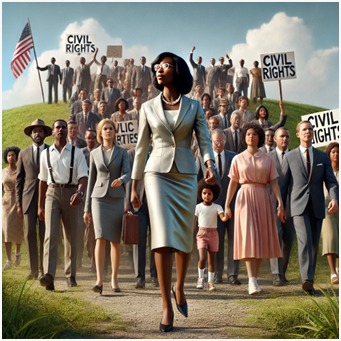I recently attended a screening of a documentary that delved into the motivations and career of Angela Davis. Often misrepresented by the media, Davis stood as a figure of unwavering strength, deeply convinced that she was on the right side of history.
As I watched, I couldn’t help but draw parallels between Davis and Kamala Harris. Davis played a pivotal role in pushing the United States toward a more integrated and civil society, even as she navigated the challenges of a country unprepared to accept a reasoned, educated, and articulate Black woman as a spokesperson for justice. Similarly, Harris, the current vice president, represents a continuation of this legacy, advocating for civil rights, civil liberties, and economic opportunity, while emphasizing the reality that women are independent agents of change—no longer relegated to the margins of society.
Legacy
Harris’s rise to the global stage didn’t occur in isolation. Diverse figures like Angela Davis, Malcolm X, the Black Panthers, SNCC, and Dr. Martin Luther King Jr. paved the way. Each of them, in their own way, championed the rights and dignity of marginalized communities, including Black Americans Hispanics, and Asians. While their methods varied—Harris in the political arena, Davis in activism, and King, Malcolm X, and others through their respective movements—they shared a commitment to social justice and the dismantling of systemic racism.
These individuals employed powerful rhetoric to inspire change, communicating the struggles of their communities through speeches, writings, and public appearances. Their ability to articulate their cause left a lasting impact on society.
Challenges
Challenging the status quo is always essential in a democratic society, particularly when social norms and structures perpetuate inequality. While the advocacy styles of leaders like King and Malcolm X differed—King through nonviolent resistance and Malcolm X initially through a more militant approach—they intersected on issues of social justice, economic inequality, gender, and human rights. Together, they contributed to a broader legacy of resistance, inspiring future generations to continue the fight for justice.
Kamala Harris’s political philosophy has been influenced by icons like Thurgood Marshall, the first Black Supreme Court justice, whose work in civil rights shaped her commitment to justice and equality. Dr. King’s influence can be seen in Harris’s advocacy for nonviolent protest. Shirley Chisholm, the first Black woman elected to Congress, Barbara Jordan, known for her oratory and dedication to social justice, and Harris’s own mother, Shyamala Gopalan, all emphasized the importance of justice, equality, and perseverance, forming the foundation of Harris’s vision.
What If
If Harris does not become the next President, critics might argue that she failed to fully capitalize on her unique position and experiences to distinguish herself from her predecessors. Potential missteps might include:
1. Defining a Stronger Personal Brand
While she has become a prominent figure, some might feel she could have better articulated her own vision and policy priorities, rather than aligning primarily with the administration’s agenda.
2. Engaging Key Voter Demographics
Strengthening connections with younger and more progressive voters may have been critical to consolidating her support base.
3. Addressing Controversial Issues
Taking clearer positions on divisive topics like criminal justice reform or immigration policy could have helped her distinguish her leadership style.
4. Balancing Vice Presidential and Political Ambitions
Balancing the role of vice president with her own ambitions posed challenges, and some might argue that she could have more assertively defined her role.
Scenario
If Harris does not become President, there could be several outcomes. Her absence might lead to a recalibration within the Democratic Party, potentially paving the way for younger or more progressive candidates to step into leadership. As a prominent woman of color, her departure could affect how future candidates approach inclusivity and representation, especially for women and people of color in leadership roles. Depending on who emerges as the next leader, the party’s focus on key issues like social justice, healthcare, and climate change might shift. Harris’s candidacy has likely mobilized specific voter demographics. Without her presence, there could be a change in voter enthusiasm and turnout, particularly among groups that resonate with her identity and policies.
While Kamala Harris’s potential departure from the presidential race would certainly have implications, we can hope and pray that the democratic process remains dynamic and responsive to public sentiment and emerging leadership. The ongoing conversations about identity politics—fueled in part by Harris’s presence—will likely continue to shape future political discourse, influencing how candidates approach representation, diversity, and policy.
Go Vote

The future of democracy is in our hands. If Harris does not win, we can only blame ourselves. The only way to protect the democratic process and continue the pursuit of equality and justice under the law is by voting for Kamala Harris. If you haven’t registered to vote yet, don’t wait, now is the time to take action. Vote early, vote for Harris, and stand up for the freedoms we hold dear. Together, we can forge a path to greater liberties for all who believe in democracy and justice.





